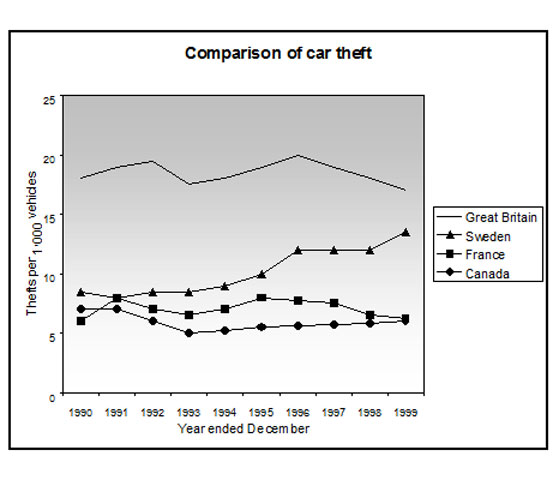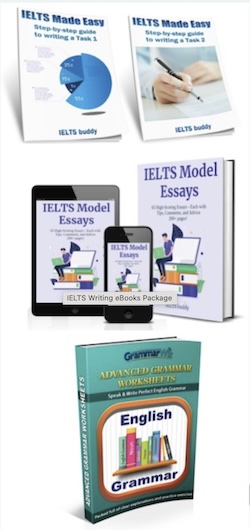- Home
- Sample Graphs
- Line Graph Examples
IELTS Line Graph Examples
Continuing with the sites IELTS line graph examples, this is an example of a line graph comparing car theft.
It's important to organise your graph clearly, draw out the key trends and make comparisons.
That has been done well in this answer.
You should spend about 20 minutes on this task.
The line graph shows thefts per thousand vehicles in four countries between 1990 and 1999.
Summarize the information by selecting and reporting the main features and make comparisons where relevant.
Write at least 150 words.
IELTS Line Graph Examples - Model Answer
The line graph compares the number of cars stolen for every 1000 vehicles in four countries from 1990 to 1999. Overall, it can be seen that car thefts were far higher in Great Britain than in the other three counties throughout the whole time frame.
To begin, car thefts in Sweden, France and Canada followed a fairly similar pattern over the first five years, all remaining at between 5 and 10 per thousand. The general trend though for France and Canada was a decline in the number of vehicles stolen over the period, with both at around 6 in 1999. In contrast, Sweden experienced an upward trend, starting the period at approximately 8, and finishing at just under 15.
Interestingly, car thefts in Great Britain started at 18 per thousand, which far exceeded that of the other countries. It then fluctuated over the next nine years, reaching a peak of 20 thefts per 1000 in 1996, and ending the period slightly lower than where it began, at approximately 17 per thousand.
(Words 174)
Comments
This graph would score highly in the IELTS test.
The graph starts with an overview that highlights the key information presented in the graph.
It has also been organised very clearly around the main trends.
The first body paragraph describes Sweden, France and Canada together as they follow a very similar pattern, whereas Great Britain is discussed separately in the second body paragraph as this follows a very different pattern.
This makes the description easy to follow and read and shows the writer has been able to make comparisons of the data.
There is also a good range of vocabulary and accurate grammar.
Comments
Any comments or questions about this page or about IELTS? Post them here. Your email will not be published or shared.


















